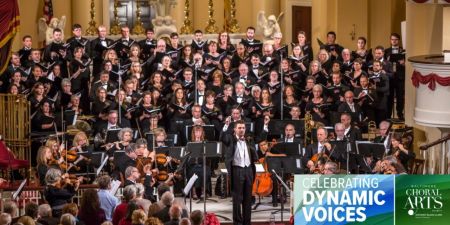2022-23 Season Premier Concert
Baltimore Choral Arts opens our 57th season with highlights from our tour of Berlin, Prague, and Vienna. This is an event to remember: the 25th Annual Ruth Blaustein Rosenberg Concert showcases musical features from our fourth European tour. Our time abroad will be celebrated upon our return in a concert with works by Mendelssohn, Handel, Berlioz, and Bernstein. The concert will take place on October 30, 2022 at Church of the Redeemer located in Baltimore, Maryland.
The evening commences with a piece entitled "TaReKiTa." The choral work was originally written in 2016 for the Urban Voices Project, a choir made up of individuals who are currently or have recently experienced homelessness. Composer Reena Esmail explained in her program notes that the piece is "near and dear" to her heart and that she was inspired to create the work in an effort to teach those within the Urban Voices Project about Indian rhythm. The program notes went on to explain that "they enjoyed the lesson so much that I wanted to write them a piece that would use what I had taught them. The result was TaReKiTa – I literally wrote it in an hour, just in a single moment of inspiration, and recorded myself singing all the parts for them to learn. It has since become a staple of our repertoire, but it’s also been sung by so many choirs around the world. There is just something about the piece, perhaps borne out of my love for this choir, that just seems to resonate with people."1
The second piece that Baltimore Choral Arts will explore on our EuroTour program is Felix Mendelssohn's "Wie der Hirsch schreit" from Psalm No. 42:1. The work was praised by composer Robert Schuman who described the piece as "the highest point that he [Mendelssohn] reached as a composer for the church. Indeed the highest point recent church music has reached at all."2 And Mendelssohn himself considered the work to be a career highlight: "[Psalm 42] is my best sacred piece… the best thing I have composed in this manner, a work I hold in greater regard than most of my other compositions." 3
Louis Hector Berlioz's "Quaerens me" will be a welcomed asset in our season premier concert. This is the fifth movement in Berlioz's Requiem entitled Grande Messe des Morts, Op. 8. Baltimore Choral Arts Associate Conductor and Pianist, Leo Wanenchak, will step away from the keys for our third piece of the EuroTour set in order to conduct the movement himself. Mr. Wanenchak has been with the Choral Arts Society since 2000 and was a conducting student of Choral Arts founder, Theodore Morrison. He has prepared the Chorus for many appearances with the Baltimore Symphony under conductors Marin Alsop, Jack Everly, John Storgårds, and Yuri Temirkanov. Mr. Wanenchak is the director of The Larks, a women’s vocal ensemble and community service project of the Junior League of Baltimore. He developed and is musical director of the ParkinSonics Choral Ensemble in conjunction with the Johns Hopkins Center for Music and Medicine.
The fourth piece that Baltimore Choral Arts will be performing in our EuroTour concert is "As pants the hart for cooling streams" HWV 251e. The anthem, composed by George Frideric Handel, was originally written for the Chapel Royal of Queen Anne. There are five versions of the work which are indicated by the letters a to e. The first was completed in 1713, and the final in 1738. Now in 2022, Baltimore Choral Arts is excited to take on the fifth and final version of this beautiful work!
The evening will conclude with music by Leonard Bernstein. From the masterful Operatic work of Candide, Choral Arts will perform "Bon Voyage," and in "Glitter and be Gay," Soprano soloist Rachel Blaustein will lead the choir. The seventh and final number of the performance will be Chichester Psalms, a work made of three movements and with a Hebrew libretto. The official Leonard Bernstein website describes the work: "Chichester Psalms juxtaposes vocal part writing most commonly associated with Church music (including homophony and imitation), with the Judaic liturgical tradition. Bernstein specifically called for the text to be sung in Hebrew (there is not even an English translation in the score), using the melodic and rhythmic contours of the Hebrew language to dictate mood and melodic character. By combining the Hebrew with Christian choral tradition, Bernstein was implicitly issuing a plea for peace in Israel during a turbulent time in the young country’s history."4


